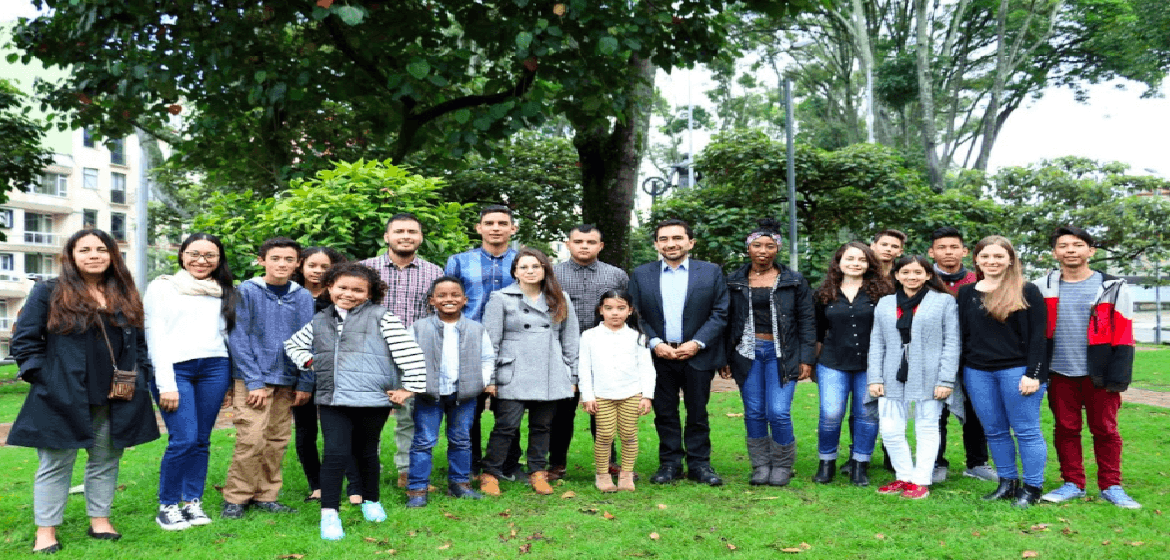The Supreme Court of Justice ordered the protection of the Colombian Amazon from deforestion, ruling in favor of a group of 25 children and youth, who with the support of Dejusticia, sued the Colombian government for failing to protect their rights to life and a healthy environment.
The Colombian government has four months to present an action plan to reduce deforestation in the Amazon region, the main source of greenhouse gas emissions driving climate change in the country. Despite Colombia’s international commitments to reduce the destruction of forests, the most recent statistics show that deforestation has increased by 44% between 2015 and 2016.
This was the order that the Supreme Court of Justice of Colombia issued earlier today in response to the legal action filed by 25 children and youth, with the support of Dejusticia. In the tutela (a legal mechanism in Colombia to protect fundamental rights), the plaintiffs claim that deforestation in the Amazon and the increase of the average temperature in the country threaten their rights to a healthy environment, life, health, food, and water. Read the original filing
The high court not only agreed with the plaintiffs’ arguments , but also stressed that the government has been ineffective on this front. In addition, the Court states that the country is facing “imminent and serious damage” because deforestation causes “the emission of carbon dioxide into the atmosphere, producing the greenhouse effect, which transforms and fragments ecosystems, and alters the water resource.”
In the lawsuit, the children and youth emphasize that future generations will be the ones to suffer the worst climate change effects. Therefore, they not only demand that the government stops deforestation, but that it also guarantees public participation in the creation of an intergenerational plan to achieve this goal.
The Supreme Court granted the plaintiffs’ petition and ordered the Presidency and the Ministries of Environment and Agriculture to create an “intergenerational pact for the life of the Colombian Amazon,” with the participation of the plaintiffs, affected communities, and research and scientific organizations, in order to reduce deforestation to zero and mitigate greenhouse gas emissions.
“It is clear, despite numerous international commitments, regulations, and jurisprudence on the matter, that the Colombian State has not efficiently tackled the problem of deforestation in the Amazon,” the Court said.
In order to protect this vital ecosystem, the Supreme Court recognized the Colombian Amazon as an “entity subject of rights,” just as the Constitutional Court did with the Atrato River last year. This means that the State has a duty to protect, conserve, maintain, and restore the forest.
The high court also ordered the municipalities of the Amazon to update their Land Management Plans (known as Planes de Ordenamiento Territorial in Spanish) within a five month period, and to develop an action plan to reduce deforestation to zero with measurable strategies. The Court also ordered the Regional Autonomous Corporations in the Amazon (known as Corporaciones Autónomas Regionales in Spanish), the environmental authorities in the region, to issue an action plan to reduce regional deforestation. These Corporations include the Corporation for Sustainable Development of the North and East Amazon, Cormacarena, and Corpoamazonía.
“This is a historic ruling both nationally and internationally,” said César Rodríguez Garavito, director of Deusticia and the lawyer representing the youth plaintiffs in the case. “At the national level, it categorically recognizes that future generations are subject to rights, and it orders the government to take concrete actions to protect the country and planet in which they live,” he added. The decision also sets a legal precedent for other climate change lawsuits. As Rodríguez stated, “the ruling is a fundamental step in the direction that other courts have been taking worldwide, ordering governments to fulfill and increase their commitments to address climate change. In this case, in addition to coalescing the scientific consensus on the importance of forests in climate change mitigation, the decision further declared the Amazon a subject of rights, allowing the protection of this essential ecosystem for Colombia and humanity.”
The central conclusions of the Court include:
-Deforestation in the Amazon causes imminent and serious damage to all Colombians of present and future generations, as it leads to rampant emissions of carbon dioxide into the atmosphere, producing the greenhouse effect, which in turn transforms and fragments ecosystems, and alters the water resource.
-The increasing deterioration of the environment is a serious attack on current and future life and on other fundamental rights; it gradually depletes life and all its related rights.
-The inability to exercise the fundamental rights to water, to breathe pure air, and to enjoy a healthy environment is making Colombians sick. It also increases the lack of fresh water and decreases the ability to enjoy a dignified life.
-The protection of fundamental rights not only involves the individual, but implicates the “other.” This includes the unborn, who also deserve to enjoy the same environmental conditions that we have.
-Without an equitable and prudent framework of consumption, the future of humankind may be compromised due to the scarcity of essential life resources. Solidarity and environmentalism are “related until they become the same.”
-We are all obligated to stop exclusively thinking about our self-interest. We must consider the way in which our daily actions and behaviors affect society and nature.
Source: Dejusticia
Related to SDG 3: Good health and well-being, SDG 16: Peace, justice and strong institutions and SDG 13: Climate action



